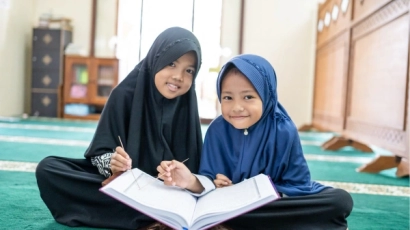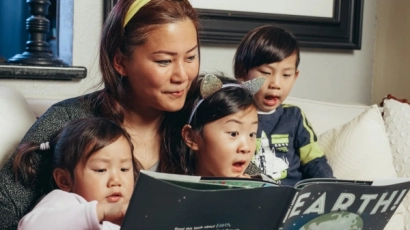We all know that it’s important to read our kids stories. There’s ample research showing that reading from a young age improves one’s literacy skills and gives them an academic edge. However, do we really understand just how important reading can be to us?
Really?
Most of us believe that reading to our kids is something that we could do if we have the time for it. It’s good to do, but not necessary, right? ONE Intervention is here to set that record straight: It is absolutely imperative that you make reading your kids stories a priority. Here are seven reasons why.

Reading kids’ stories increases their literary skill
Okay, this one is pretty self-explanatory. But it’s one of the primary reasons why reading kids’ stories is just so important. Stories are one of the first formal exposures that a child has to language. It shows to children how letters and words can be strung into something that has meaning.
Through storytelling, we teach our kids how to make use of language to communicate a message. It’s the most direct way children can learn how grammar, spelling, and punctuation works. As they grow older and the stories we read to them become more vivid, children can pick up on a broader range of vocabulary as well.
This is because the vocabulary used by parents in our everyday lives is often repetitive, as Mindchamp’s article points out. Think about it, how many different ways can you say ‘Hurry up, it’s time for supper!’ ?
Yeah, not that many.
Stories illustrate a more varied and richer range of vocabulary that can benefit our children in their later academic life. Also, they teach kids how to clearly express a message in an engaging and eloquent way. All of this culminates in a stronger grasp of literary skill. And it stems from the simple act of reading kids’ stories.
Their imaginations are broadened
Reading kids’ stories also introduces children to the concept of imagination. So many of the fairytales we know and love are grounded in fantasy, rather than reality. By reading to our children, we teach them about a world beyond the mundane that they live and know.
This is because when we read, we need to use our imaginations to picture the setting. What’s going on in the background? What are the characters doing? What’s happening now and what might happen next?
This power to imagine possibilities beyond what is directly in front of them is undeniably invaluable. Essentially, all that fiction teaches our kids how to dream.

And isn’t that useful? In a practical context, this broadened imagination teaches your child to be more open minded. They learn to be comfortable with uncertainties, to push the what ifs and what happens whens. This curiosity in turn encourages them to be even more imaginative, which leads to a positive feedback cycle of insightful questioning.
More than that – a broadened imagination naturally leads to more creative thinking. This is one of the most valuable skills you can impart to your child so they can thrive in a rapidly changing world.
Reading builds emotional intelligence
How many times have we seen ourselves in the heroes of our stories? Often, we idealise a character because they have certain traits that we either admire, aspire to be, or both. The same holds true for any story – including, and perhaps especially, kids’ stories.
Storytelling teaches our children to see themselves in characters. Good stories articulate the suffering of both the heroes and villains. Hence, when we read our kids these stories, they root for them and thus learn how to empathise with these characters.
Extrapolated to a broader context, our kids are then able to apply that same emotional sensitivity to their daily lives. Stories teach them to look out for the underdogs and take care of their friends.
Because stories often present nearly impossible circumstances for intrepid heroes to get out of, they also indirectly teach our children how to navigate challenges. Therefore, they learn from stories the perseverance and resilience needed to survive difficult situations.
More than that, reading also encourages children to emotionally regulate themselves. The heroes of our fairytales are often presented as even-tempered, calm and fair. This provides a helpful model for children to follow, as they try their best to emulate their heroes. In doing so, our kids strengthen their emotional intelligence.

Introduces moral values
Most kids’ stories have a ‘moral of the story’ moment. For example, the Tortoise And The Hare popularised the adage ‘slow and steady wins the race.’ Hence, the fairytales we read to our kids are able to impart to them important moral lessons that may well go on to serve them for a lifetime.
This is because our children are young and impressionable. Often, we take this to mean that we should be cautious and refrain from undesirable behavior around our kids. That’s a given. But the inverse is also true: Our kids are equally impressionable to desirable behaviour, such as being respectful to others and being kind.
Thus, stories provide a way to make a lasting impression of good morals to our children. By teaching them that the heroes win in stories, they are more likely to want to be like the heroes. To be compassionate and gracious and brave. It’s true that reality is not always so black-and-white. However, stories are an excellent platform to start with showing our kids that good and bad do exist, before we teach them about the shades of grey.
According to this article by BBC, scientists have discovered a strong link between people who read fiction and their ability to be more empathetic and understanding of other people’s behaviours. So, reading really does instill a more thorough understanding of morals in our children.
Reading kids’ stories promotes creative thinking
Earlier, we established that reading kids’ stories broadens their imagination. Naturally, this also promotes their creative thinking. With a more open mind, our kids are able to envision unique solutions to complicated problems.
This out-of-the-box creativity is absolutely invaluable in the current volatile twenty-first century. To thrive and succeed, your child needs to be able to come up with novel ideas for novel challenges. Reading encourages and fuels this creativity.

When reading, ask your kid questions to encourage them to think more creatively. A simple ‘How do you think this story will end?’ teaches them how to consider all possibilities, then consider all plausible possibilities that this story ends in. This skill of divergent thinking will serve them well into adulthood.
Encourages greater concentration
When you read to your kids, you’re teaching them how to sit still and actively listen. They have to do that in order to absorb the story from start to end. Hence, this indirectly teaches your children the value of focus: If they pay attention to this story, they’re going to be rewarded by finding out what happens next.
This may seem a little ridiculous to ask of your overly-excited toddler, at first. However, consistent reading time and lots of practice will eventually impart this lesson to them. Even if your child never really enjoys story time, it can be hugely beneficial to instill in them the discipline needed to be quiet for a set period of time, for a set activity.
Needless to say, the ability to focus as needed is a hugely useful skill in school and later in work. It’s undeniable that at one point or the other, your child is going to need to sit down and concentrate on a task. Whether that task is something they enjoy doing or not, they do need to develop the necessary focus to complete the task.
Reading is a small way of teaching them that skill from a young age.
Facilitates parent-child bonding

Storytelling typically begins with you, the parent, reading to your child. Sure, after a few years your child will be more than capable of reading by themselves. But until then, it’s your duty to read to them and with them.
This facilitates parent-child bonding because at the end of the day, storytime then becomes another activity where you spend time with your child. By taking time out of the day to sit and read quietly to your kid, you’re showing them that reading to them is important to you.
Also, storytelling to your kid shouldn’t just be a static monologue. Ask your kid questions about the story they read. Ask for their opinions and favourite characters. This shows your child that you genuinely value what they have to say. If they have nothing to say, share your own thoughts on the story. All of this facilitates conversation. And naturally, with more conversation and communication between you and your child, your bond will grow stronger.
There we have it: 7 Important (and Surprising!) Reasons To Read Kids Stories. And now that we know just why reading kids’ stories is so important, why not bring your little one to a library? We’ve curated a list of the 5 Magical Kid-friendly Libraries in Singapore to visit at your pleasure.
Can you think of any more reasons to read stories to your kids? Or perhaps you have a specific story in mind that you’d like to recommend to us? Well, drop us a comment below, we’d love to hear from you! 💬👇
